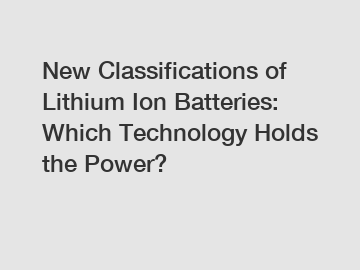Jan. 07, 2024
Electrical Equipment
Lithium Storage Product Page
New Classifications of Lithium-Ion Batteries: Which Technology Holds the Power?
Lithium-ion batteries have revolutionized the world of portable electronics, powering everything from smartphones to electric vehicles. As technology progresses, researchers and engineers are constantly searching for new and improved classifications of lithium-ion batteries that can offer higher energy density, improved safety, and longer lifespan. This quest has given rise to various innovative battery technologies, each with its own unique merits and drawbacks. In the race to find the ultimate lithium-ion battery technology, which one holds the real power?

1. Lithium Iron Phosphate (LiFePO4) Batteries:
One contender in the new wave of classifications is the Lithium Iron Phosphate (LiFePO4) battery. Known for its exceptional safety attributes, this technology has gained popularity in electric vehicles and energy storage systems. LiFePO4 batteries have a higher thermal stability, making them less prone to thermal runaway and reducing the risk of explosions or fires. Additionally, these batteries exhibit a longer cycle life, providing a greater number of charge-discharge cycles compared to traditional lithium-ion batteries. However, the drawback lies in their lower energy density, limiting their overall capacity compared to other options.
2. Lithium Nickel Cobalt Aluminum Oxide (NCA) Batteries:
On the other end of the spectrum, Lithium Nickel Cobalt Aluminum Oxide (NCA) batteries offer higher energy density and power capability. This technology is commonly used in electric vehicles and provides a longer driving range due to its superior capacity. However, NCA batteries are more prone to thermal instability, increasing the risk of overheating and safety concerns. Balancing these drawbacks can be challenging, especially as demands for higher energy density and longer lifespan increase.
3. Lithium Nickel Manganese Cobalt Oxide (NMC) Batteries:
Lithium Nickel Manganese Cobalt Oxide (NMC) batteries strike a balance between LiFePO4 and NCA batteries. They offer a good compromise between energy density, safety, and cycle life. NMC batteries are commonly used in portable electronics like laptops, tablets, and smartphones. Their versatility and moderate cost make them a popular choice among manufacturers. Although NMC batteries have improved safety compared to NCA, they are still prone to some degree of thermal instability.
4. Lithium Titanate (LTO) Batteries:
Lithium Titanate (LTO) batteries are making strides in the industry due to their exceptional lifespan and high power capability. These batteries use lithium titanate as the anode material, which allows for rapid charging and discharging without compromising the overall performance. LTO batteries also showcase excellent thermal stability and a long cycle life of over 10,000 cycles. However, they suffer from lower energy density, limiting their use in applications requiring higher capacity.
In conclusion, the quest for new classifications of lithium-ion batteries has led to the development of several promising technologies. Each classification offers its own set of advantages and disadvantages, catering to different applications and requirements. While LiFePO4 batteries prioritize safety and cycle life, NCA batteries focus on energy density and power capability. NMC batteries strike a balance between the two, and LTO batteries excel in lifespan and power. Ultimately, the choice of technology depends on the specific needs of the application, taking into consideration factors such as safety, energy density, lifespan, and power capability.
As technology continues to evolve, we can expect further advancements in lithium-ion batteries and the emergence of new classifications that offer even greater performance. The power to revolutionize industries, from transportation to renewable energy storage, lies in the hands of these innovative battery technologies. The key challenge for researchers and engineers is to find the perfect balance between safety, energy density, lifespan, and power capability, opening up new possibilities and driving the energy revolution forward.
Please visit our website for more information on this topic.
The company is the world’s best lithium-ion battery module supplier. We are your one-stop shop for all needs. Our staff are highly-specialized and will help you find the product you need.
If you are interested in sending in a Guest Blogger Submission,welcome to write for us!
All Comments ( 0 )